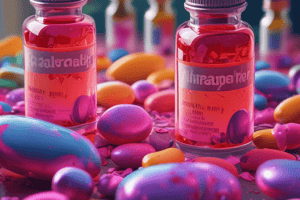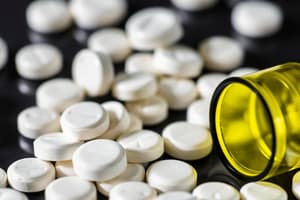Podcast
Questions and Answers
What is the primary amino acid from which norepinephrine is made?
What is the primary amino acid from which norepinephrine is made?
- Cysteine
- Phenylalanine
- Tyrosine (correct)
- Tryptophan
Which receptor type is associated with an increase in blood pressure due to smooth muscle contraction?
Which receptor type is associated with an increase in blood pressure due to smooth muscle contraction?
- Alpha-2
- Alpha-1 (correct)
- Beta-1
- Beta-2
Which receptor type causes vasodilation, bronchodilation, and glycogenolysis?
Which receptor type causes vasodilation, bronchodilation, and glycogenolysis?
- Alpha-2
- Alpha-1
- Beta-2 (correct)
- Beta-1
What type of protein is associated with beta-1 receptors?
What type of protein is associated with beta-1 receptors?
What happens when alpha-2 receptors are activated?
What happens when alpha-2 receptors are activated?
Which neurotransmitter preferentially binds to beta receptors?
Which neurotransmitter preferentially binds to beta receptors?
What causes the release of norepinephrine via exocytosis?
What causes the release of norepinephrine via exocytosis?
How is norepinephrine metabolized into an inactive metabolite?
How is norepinephrine metabolized into an inactive metabolite?
Which protein is associated with alpha-1 receptors?
Which protein is associated with alpha-1 receptors?
What happens when Beta-2 receptors are activated?
What happens when Beta-2 receptors are activated?
What stimulates voltage-gated calcium channels leading to the release of norepinephrine?
What stimulates voltage-gated calcium channels leading to the release of norepinephrine?
Which receptor type is associated with a decrease in sympathetic tone?
Which receptor type is associated with a decrease in sympathetic tone?
What is the primary effect of alpha blockers on the internal urethral sphincter?
What is the primary effect of alpha blockers on the internal urethral sphincter?
Which receptors do alpha-2 receptors inhibit norepinephrine release from?
Which receptors do alpha-2 receptors inhibit norepinephrine release from?
What physiological effect do beta blockers have on renin release from the juxtaglomerular cells?
What physiological effect do beta blockers have on renin release from the juxtaglomerular cells?
What is the primary effect of beta blockers on beta-1 receptors in the heart?
What is the primary effect of beta blockers on beta-1 receptors in the heart?
What potential adverse effect can result from inhibiting alpha-1 receptors with alpha blockers?
What potential adverse effect can result from inhibiting alpha-1 receptors with alpha blockers?
Which receptors do beta blockers stimulate contraction and urination through?
Which receptors do beta blockers stimulate contraction and urination through?
What is the primary effect of alpha blockers on pupil constriction?
What is the primary effect of alpha blockers on pupil constriction?
Which physiological effect do beta blockers have on smooth muscle relaxation in the bronchioles?
Which physiological effect do beta blockers have on smooth muscle relaxation in the bronchioles?
What is the primary effect of beta-3 blocking drugs on lipolysis?
What is the primary effect of beta-3 blocking drugs on lipolysis?
What is the main purpose of using beta-1 blockers in portal hypertension?
What is the main purpose of using beta-1 blockers in portal hypertension?
What potential adverse effect can result from using beta-1 blockers in patients with decompensated heart failure or super bradycardia?
What potential adverse effect can result from using beta-1 blockers in patients with decompensated heart failure or super bradycardia?
What type of urinary disorder can alpha-1 blockers be beneficial for?
What type of urinary disorder can alpha-1 blockers be beneficial for?
Flashcards
Norepinephrine
Norepinephrine
Neurotransmitter released from adrenergic neurons, made from tyrosine, a specific amino acid. It binds to various receptors, influencing different physiological effects.
Tyrosine Transporter
Tyrosine Transporter
A co-transporter in nerve terminals responsible for taking up tyrosine, the precursor molecule for norepinephrine.
Dopamine
Dopamine
Substance produced from tyrosine in nerve terminals, converted into norepinephrine within vesicles. It acts as a neurotransmitter and plays a role in regulating various bodily functions.
Vesicles
Vesicles
Signup and view all the flashcards
Voltage-Gated Calcium Channel
Voltage-Gated Calcium Channel
Signup and view all the flashcards
Exocytosis
Exocytosis
Signup and view all the flashcards
Alpha Receptor
Alpha Receptor
Signup and view all the flashcards
Alpha-1 Receptor
Alpha-1 Receptor
Signup and view all the flashcards
Alpha-2 Receptor
Alpha-2 Receptor
Signup and view all the flashcards
Beta Receptor
Beta Receptor
Signup and view all the flashcards
Beta-1 Receptor
Beta-1 Receptor
Signup and view all the flashcards
Beta-2 Receptor
Beta-2 Receptor
Signup and view all the flashcards
Epinephrine
Epinephrine
Signup and view all the flashcards
Catechol Methyl Transferase (COMT)
Catechol Methyl Transferase (COMT)
Signup and view all the flashcards
Alpha Blockers
Alpha Blockers
Signup and view all the flashcards
Beta Blockers
Beta Blockers
Signup and view all the flashcards
Orthostasis
Orthostasis
Signup and view all the flashcards
Intraoperative Floppy Iris Syndrome (IFIS)
Intraoperative Floppy Iris Syndrome (IFIS)
Signup and view all the flashcards
Urological Benefit
Urological Benefit
Signup and view all the flashcards
Alpha-1 Blockers
Alpha-1 Blockers
Signup and view all the flashcards
Beta-1 Blockers
Beta-1 Blockers
Signup and view all the flashcards
Bradycardia
Bradycardia
Signup and view all the flashcards
Study Notes
- The text is about discussing adrenergic antagonists, specifically alpha and beta blockers.
- Adrenergic neurons release neuroepinephrine, which is made from tyrosine, a specific amino acid.
- Tyrosine is taken up into nerve terminals via co-transporter and converted into dopamine, which is then converted into noroepinephrine within the vesicles.
- Norepinephrine is released via exocytosis when an action potential runs down the neuron, stimulating voltage-gated calcium channels.
- Norepinephrine can bind to various receptors: alpha-1, alpha-2, beta-1, beta-2, and beta-3.
- Alpha-1 receptors (Gq protein) increase intracellular calcium levels, causing smooth muscle contraction and increase in blood pressure.
- Alpha-2 receptors (Gi protein) decrease intracellular cyclic AMP levels, inhibiting norepinephrine release and decreasing sympathetic tone.
- Beta-1 receptors (Gs protein) increase intracellular cyclic AMP levels, causing increased heart rate, contractility, and secretion.
- Beta-2 receptors (Gs protein) cause vasodilation, bronchodilation, and glycogenolysis in the liver.
- Epinephrine, a catecholamine like norepinephrine, preferentially binds to beta receptors and is released from the adrenal medulla.
- Norepinephrine can be metabolized by catechol methyl transferase into an inactive metabolite, or taken back up into the synaptic vesicle for recycling.
- Alpha blockers inhibit the effects of norepinephrine at alpha receptors, decreasing systemic vascular resistance and blood pressure.
- Beta blockers inhibit the effects of norepinephrine and epinephrine at beta receptors, opposing the increase in heart rate, contractility, and secretion.
- Alpha blockers may inhibit contraction of the internal urethral sphincter, allowing for urination.
- Alpha blockers can cause pupil constriction, leading to intraoperative floppy iris syndrome.
- Alpha-2 receptors inhibit norepinephrine release, decreasing sympathetic tone.
- Alpha-2 receptors in pancreatic beta cells increase insulin production and release, lowering blood glucose levels.
- Beta blockers inhibit beta-1 receptors in the heart, decreasing contractility and heart rate.
- Beta blockers inhibit renin release from the juxtaglomerular cells, decreasing the activity of the renin-angiotensin-aldosterone system and blood pressure.
- Beta-2 receptors cause vasodilation and bronchodilation, but beta blockers inhibit these effects, potentially increasing resistance and blood pressure.
- Beta blockers inhibit smooth muscle relaxation in the bronchioles, causing bronchoconstriction.
- Beta blockers inhibit glycogenolysis and gluconeogenesis in the liver, potentially causing hypoglycemia.
- Beta-3 receptors cause smooth muscle relaxation in the bladder, but beta blockers stimulate contraction and urination.
- Beta blockers have non-selective effects on beta receptors, potentially causing lipolysis and free fatty acid release.- Epinephrine and norepinephrine bind to receptors, causing various physiological effects.
- Alpha receptors oppose the actions of epinephrine and norepinephrine.
- Alpha blockers prevent epinephrine and norepinephrine from binding to alpha receptors, inhibiting their effects.
- Alpha blockers are more selective for alpha-1 receptors and have less affinity for alpha-2 receptors.
- Beta-3 blocking drugs inhibit lipolysis and can increase triglycerides in the blood, potentially leading to both beneficial and adverse effects.
- Alpha blockers are used to treat conditions such as high blood pressure, angina, and certain heart rhythm disorders.
- Adverse effects of alpha blockers can include hypotension, dizziness, and bronchoconstriction.
- Examples of alpha blockers include phentolamine, phenylephrine, and phenylephrine hydrochloride.- The text discusses various types of drugs called alpha and beta blockers, specifically alpha-1 blockers and beta-1 blockers
- Alpha-1 blockers work by inhibiting the effects of alpha-1 receptors on blood vessels, sphincters, and the pupil
- Inhibiting alpha-1 receptors can cause a decrease in venous return, leading to orthostasis as a potential adverse effect
- Alpha-1 blockers can also decrease systemic vascular resistance, making them useful for treating hypertension
- They can also be beneficial for patients with urinary incontinence caused by an enlarged prostate
- Beta-1 blockers work by inhibiting the effects of beta-1 receptors on the heart, causing a decrease in heart rate and contractility
- They can be useful in situations where there is an excessive production of adrenaline or thyroid hormones, as they can block the increased sensitivity of beta-1 receptors
- Beta-1 blockers can also be used prophylactically in portal hypertension to reduce the risk of varices and upper GI bleeds
- They can also be used to reduce cerebral blood flow and inhibit pain receptors, making them useful in migraine prophylaxis
- Beta-1 blockers can also inhibit the afferent and efferent signals in muscle spindles, reducing tremors in essential tremors
- Commonly used beta-1 blockers include propranolol, metoprolol, esmolol, bisoprolol, and atenolol
- Adverse effects of beta-1 blockers include bradycardia and decreased cardiac output in patients with decompensated heart failure or super bradycardia.
Studying That Suits You
Use AI to generate personalized quizzes and flashcards to suit your learning preferences.





